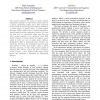Free Online Productivity Tools
i2Speak
i2Symbol
i2OCR
iTex2Img
iWeb2Print
iWeb2Shot
i2Type
iPdf2Split
iPdf2Merge
i2Bopomofo
i2Arabic
i2Style
i2Image
i2PDF
iLatex2Rtf
Sci2ools
HICSS
2003
IEEE
2003
IEEE
Investigating the Causes of Seed Returns in the Agribusiness Industry
This research explores the causes of dealer demand amplification leading to a high volume of seed returns in a typical agribusiness supply chain. Seed production occurs months in advance of grower demand, resulting in a limited supply of specific seeds. To hedge against shortages, dealers inflate orders. If demand materializes, dealers benefit from their inflationary behavior. If it does not, they incur no considerable losses since they can return excess inventory at no additional costs. With limited visibility of actual demand the supplier cannot assess if orders are real or simply dealer inflation. Salespeople’s effort in positioning seeds, however, can clarify the distinction. But salespeople must also push seed delivery to meet sales targets. Using a system dynamics approach, we learn that policies capable of reducing seed returns: control the pace of dealers’ orders, provide a more frequent sales target review period, and implement a framework for sales-people behavior.
Biometrics | Dealer Demand Amplification | Dealers Inflate Orders | HICSS 2003 | Seed Returns | System Sciences |
| Added | 04 Jul 2010 |
| Updated | 04 Jul 2010 |
| Type | Conference |
| Year | 2003 |
| Where | HICSS |
| Authors | Paulo Gonçalves, Jim Rice |
Comments (0)

